How Your Dentist Can Tell if You Might Have Sleep Apnea
 Sleep apnea
Sleep apnea is a very common problem that a lot of people suffer from. The disorder can be very dangerous to one’s health, however with the help of a dentist the signs can be identified and the appropriate steps can be taken to reduce symptoms.
It may be surprising to learn that a dentist plays a role in
sleep apnea, but in actuality, they undergo a lot of training to detect, diagnose, and treat sleeping disorders. In the case of
sleep apnea, the oral cavity plays a big part, which is where a dentist can be quite helpful.
Dentists can check for sleep apnea symptoms in patients during a check-up visit. Some individuals are completely unaware of their sleep apnea, which is why having a dentist check the oral cavity can be helpful. Keep reading to learn more about how they detect the condition.
How a dentist detects sleep apnea
Outlined below are a few ways in which a dentist can identify sleep apnea in patients. This information can be incredibly helpful to review when feeling unsure whether sleep apnea is an existing problem.
Weakened teeth
When looking for sleep apnea, dentists start by examining the teeth. If the teeth appear to be worn down or weak then teeth grinding may be occurring, which is a symptom of sleep apnea. When suffering from sleep apnea, individuals often clench down on their jaw as a way to wake themselves up. Over time, clenching can result in weakened enamel, which can translate to weaker teeth overall. The dentist can carefully examine the teeth to see whether the enamel has been worn off.
Small jaw
Individuals that suffer from sleep apnea will also have a much smaller jaw. Over time, if clenching occurs as a result of sleep apnea, the jaw will begin to shrink, thus making it appear smaller. Dentists can examine the jaw as a way to determine whether sleep apnea is present.
Scalloped tongue
A tongue that has scalloped edges is another sign that sleep apnea is a problem. When the airway becomes obstructed, the tongue is often at fault. It can block off airflow, which over time, can lead to the tongue becoming worn down and oddly shaped. A scalloped tongue often appears to have waves or ripples in it.
Redness in the throat
One of the main symptoms of sleep apnea is snoring. Because the airway becomes obstructed, the throat often suffers, thus causing snoring. Chronic snoring can lead to a red throat, which may be inflamed or irritated. The dentist can carefully examine the throat for any redness, inflammation, or swelling.
See a general dentist for a sleep apnea check
Individuals who suspect they have sleep apnea should consult directly with a general dentist for a full evaluation. Any questions or concerns can be addressed, and the dentist can check the oral cavity for any warning signs. Reach out today to get scheduled for an appointment or to learn more.
Request an appointment here: https://dentalhealthde.com or call John M. Facciolo D.M.D., P.A. at (302) 652-2451 for an appointment in our Wilmington office.
Recent Posts
Millions of people all over the world live with sleep apnea, however, a good number of those are yet undiagnosed. Most people would probably think of a sleep clinic first for diagnosis and treatment, but the general dentist is sometimes the first professional to discover signs of the condition. They also provide options to ease…
An oral appliance is one of the treatment options for sleep apnea. Many patients prefer this type of device because they are more comfortable than wearing a mask and that they are portable and can be moved around easily. It is a convenient and less-invasive way to treat the symptoms of sleep apnea. Continue reading…
Wondering why to choose a kid friendly dentist? A child's dental needs are going to differ from a parent's dental needs. This makes it a good idea for parents to find a dental professional who knows how to take care of a child's oral health. It is also a good idea because whenever questions arise…
Dental bonding is a fast and effective way to fix cosmetic dental issues. The procedure is performed using tooth-colored resins that are applied directly to teeth and cured with an ultraviolet light.It takes 30 to 60 minutes to repair a tooth with composite resin. The treatment only requires a single visit to a dentist, and…

![A Kid Friendly Dentist In Wilmington Explains How Sugar Can Affect A Child&# ;s Oral Health [Quick Guide]](/wp-content/uploads/kid-friendly-dentist-2203.jpg)
